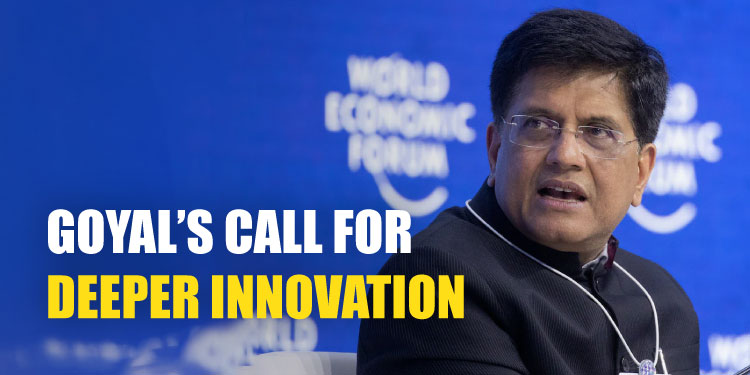“India’s startup space is too focused on food delivery and gig work.”
This stark observation by Goyal last week didn’t just spark debate — it struck a nerve. For an ecosystem that prides itself on unicorns and funding rounds, this was a much-needed reality check.
The comparison with China was deliberate and loaded. While India has seen a boom in convenience-led platforms — food delivery, ride-hailing, and quick commerce — China has marched ahead with deep innovation in sectors like semiconductors, AI hardware, electric vehicles, and quantum computing.
Goyal’s statement throws light on a critical crossroads for Indian startups: Will we continue to build comfort-driven apps or start solving for the next generation of global challenges?
The Gig Economy: A Good Start, But Not the Finish Line
There’s no denying that startups like Swiggy, Zomato, Dunzo, and Urban Company have transformed how urban India lives. They’ve created jobs, brought efficiencies, and digitized everyday services. For the investor community, these ventures made India’s startup space exciting high growth, high visibility, and replicable success stories.
But Goyal’s concern is not about these startups succeeding, it’s about what the ecosystem isn’t doing enough of. A vast portion of capital and talent continues to circle around services that solve convenience, not complexity.
These platforms are often built on copy-paste models that worked in the West and are customized for Indian cities. But how many of these are genuinely original or IP-driven? How many are truly building tech that can’t be easily duplicated?
Why Goyal’s Comparison with China Hits Home
When Goyal mentioned China, it wasn’t just to provoke. It was to point out the contrast in innovation priorities.
China has backed its startups not just with money, but with policy alignment, deep R&D, government-industry-academia linkages, and massive manufacturing muscle. Startups like DJI (drones), BYD (EVs), and SenseTime (AI) aren’t just tech firms, they are national champions.
India, on the other hand, has struggled to build hardware unicorns or deeptech brands at scale. The support ecosystem for founders in these areas is still nascent, limited funding, regulatory friction, and lack of infrastructure make it harder for startups outside SaaS and services to thrive.
The result? Our top engineering talent often ends up working on the next grocery app, rather than the next breakthrough in climate tech or semiconductors.
What Is Deeptech, and Why Does It Matter?
Deeptech refers to startups based on substantial scientific or engineering advances like AI, robotics, biotech, quantum computing, materials science, or space tech. These startups are not just looking to scale fast, they are looking to solve fundamental problems.
Unlike gig-based apps or platforms, deeptech startups typically require:
- Long development cycles
- Heavy initial investment in R&D
- Interdisciplinary expertise
- Patience from both founders and investors
But the payoff? Game-changing impact and defensible IP that can position India as a global innovation leader, not just a market for low-margin services.
Goyal’s comments suggest that while India has the talent for deeptech, we haven’t built the ecosystem that supports long-term, research-led entrepreneurship.
Are Indian Startups Playing It Too Safe?
There’s an argument to be made that India’s startup culture has become too risk-averse. With investors prioritizing quick returns, founders are often nudged towards models that offer faster monetization.
The outcome?
A saturation of similar ideas — another food delivery player, another edtech platform, another last-mile service. Meanwhile, startups attempting to build hardware or solve scientific challenges often struggle to raise funds, get government approvals, or find the right talent.
In the race to scale fast, we may have lost the art of building deep.
What Needs to Change?
To respond to Goyal’s wake-up call, India must go beyond just acknowledging the problem. The shift toward a deeper innovation culture will require:
1. More Patient Capital
Venture capital needs to evolve. We need investors willing to back startups with 7–10 year horizons, especially in sectors like clean energy, space tech, or biotech.
2. Stronger Industry-Academia Collaboration
India’s top institutions IITs, IISc, and research labs must partner more deeply with startups. Incubation support, access to lab infrastructure, and industry fellowships can fast-track tech translation from lab to market.
3. Policy & Regulatory Support
Simplifying compliance, offering R&D grants, incentivizing local manufacturing, and protecting IP can create a more favorable environment for innovators in deeptech domains.
4. Celebrating Innovation Over Imitation
The media and startup community need to stop celebrating every new delivery app or celebrity-led fintech as “disruption”. Let’s spotlight those solving for India’s unique challenges — water scarcity, rural healthcare, sustainable farming, disaster tech, and more.
Green Shoots of Hope
Despite these challenges, India is seeing the first signs of a deeper shift.
Startups like Agnikul Cosmos and Skyroot Aerospace are building launch vehicles for space. Companies like Niramai are using AI for early breast cancer detection. Iris.ai, String Bio, and Log9 Materials are showing that India can build disruptive deeptech companies with the right support.
In 2023 alone, India saw a record number of patent filings and tech transfers from academia to startups. The signs are promising but this momentum must scale.
Final Thoughts: From Valuations to Vision
Goyal’s critique shouldn’t be viewed as an attack. It’s a mirror held up to a rapidly growing, but often short-sighted ecosystem. India’s startup story has been an incredible leapfrog from underdog to unicorn factory in less than a decade.
But now, we need version 2.0. A version where startups don’t just deliver goods — they deliver global breakthroughs. A version where innovation isn’t limited to urban consumption but extends to core national needs and global problems.
It’s time to shift from hustle to purpose. From convenience to complexity. From being known for apps to being respected for original ideas that change the world.
India can get there but only if we dare to build what no one else is building.













































